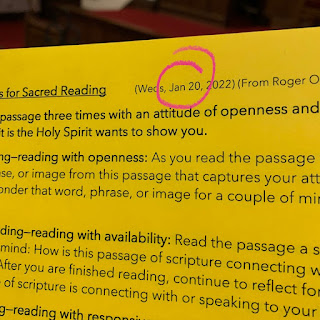Whoa.
I'm used to hearing Jesus say, "Why are you so afraid?" That question alone is asked multiple times throughout the pages of Scripture by God in various ways to various people through various means.
But when Jessica and Kate write, "Jesus might have said, instead, 'I thought you knew me,'" well, that just grabbed on to my heart and wouldn't let it go.
It reminds me of the experience I had Wednesday night during our time of solitude and silence. We're in week 2 of gathering in the sanctuary Wednesdays from 5:30 - 6:30 p.m. and being silent together. (The sanctuary is plenty big enough to spread out and feel like you're alone!)
I set up candles on the communion table to watch and to light, then add some papers for prayer requests, a guided reading for a Scripture passage, and a guided prayer to reflect back over the day.
Last week, I picked this passage from Mark 8:22-29 ...
They came to Bethsaida, and some people brought a blind man and begged Jesus to touch him. He took the blind man by the hand and led him outside the village. When he had spit on the man’s eyes and put his hands on him, Jesus asked, “Do you see anything?” He looked up and said, “I see people; they look like trees walking around.” Once more Jesus put his hands on the man’s eyes. Then his eyes were opened, his sight was restored, and he saw everything clearly. Jesus sent him home, saying, “Don’t even go into the village.” Jesus and his disciples went on to the villages around Caesarea Philippi. On the way he asked them, “Who do people say I am?” They replied, “Some say John the Baptist; others say Elijah; and still others, one of the prophets.”
“But what about you?” Jesus asked. “Who do you say I am?”
Then I added the questions: who is Jesus to you? What your relationship with him? If you could ask him to meet you in your deepest need, what would that look like?
And I thought about how important it is to know the answer to that question, to know what images come to mind when we think of God, to be able to articulate the kind of relationship that we have with God.
Kate and Jessica talk about all the things the disciples had seen Jesus do ... and yet, they were still "incredulous" when he appears to them post-resurrection (p 40). Are we too still incredulous?
Seeing that we ourselves are reading this book in the season of Easter -- the weeks between Easter and Pentecost -- this seems like a question we should linger over longer: who do you say Jesus is?
And then they ask: Why is it that we so often have "a picture of who we want God to be?" (p 41) And "how we want God to act?" (p 42) that may not match up with what we know of God? (We're getting dangerously close to idolatry again which we already talked about earlier here.)
We worship a God who falls asleep during a storm. Who calls us to "love the stranger and foreigner and enemy. The one who leads us into chaos. The one who heals some but not all. ... And the one whose presence remains but whose absence is always before us in this broken world. We marvel at the God loves us and stays by our side, regardless of how little we understand or how often we wonder if our savior is asleep" (pp 41-42).
There's a steadfastness in that that I love, like the "little way of love," that we talked about yesterday.
They don't try to answer the "why" of the questions we're asking; they simply accept that God is bigger than us and so much more than we can ever comprehend.
"Oh God, comfortable would we be if You gave us formulas and answered prayers and realized hope. But You call us beyond comfort. ... May again and again we be awed by Your presence. That even when we feel like we've hit rock bottom, may we recognize we have fallen into Your arms because there is no place so deep or so dark or so scary that Your presence cannot reach." (p 43).
Pastor Allison
I'm curious:
In the "A Good Enough Step" on page 44, they write:
"Let is surface - that fear that is just below the surface, masquerading as frustration or irritability or tension. Let it come forward to your mind and sit with it awhile. Then put it into a prayer - something very specific and simple that says, "God, please take over all of this, just for today." Rest.
Why don't you give that a try today?



